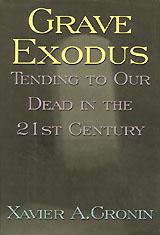
Ashes to ashes, profit to profit
|
This review first appeared in the American Reporter in 1996.
Like fingernails on a blackboard, death grates on America's nerves. We don't like to talk about, deal with – hell, even acknowledge it. But death is a multibillion-dollar-a-year industry in this country, an industry with its own trade shows and magazines.
From those magazines comes Xavier Cronin, an editor at American Funeral Director and American Cemetery magazines. Cronin's "Grave Exodus" looks at the changing patterns of American funeral traditions, specifically the move away from burial to cremation.
He gives a nice historical perspective on the current industry, tracing the move to suburban cemeteries over the last century, and America's resistance to cremation. Cronin also compares America's death rituals and practices to those of other cultures, and points out that the American way of death is pretty eccentric – and expensive – when compared to the rest of the world.
But the real story, the dramatic tension, in Cronin's book comes from the apparently nasty battle between cremation advocates and more traditional funeral directors.
As played out in "Exodus," the more strident cremation advocates see all funeral directors as money-grubbing bastards out to rip off families in their time of grief. Many have formed cremation societies that provide their members low-cost funeral and cremation services that run into the mid-hundreds instead of into the thousands that a traditional burial can cost.
For the true-believer cremationists, though, simply offering a choice isn't enough: They want to destroy the traditional funeral parlor.
For their part, the funeral directors seem frightened by the move to cremation, afraid of losing their livelihood. At first, when cremation grew in popularity in the 1970s, the funeral industry (or "death-care industry," as they prefer to be euphemized) reacted by attacking cremation as blasphemous and disrespectful to the dead. That strategy was neither endearing nor effective, and so now funeral directors are being urged by industry leaders to incorporate cremation services into their menu.
Cronin clearly sympathizes at least a little with the funeral directors, and takes little stock in the heated rhetoric of the more extreme creation advocates. He repeatedly asks the militants if there might not be one or two decent, ethical funeral directors somewhere in America – a point several end up conceding.
Still, Cronin is as dubious as any when it comes to the pricing of caskets and how they are sold – indeed, for the very purpose behind caskets, which Cronin reports are unique to America, the rest of the world still using the simple coffin. The question Cronin returns to again and again is why do corpses need to be protected from the ravages of decay and the elements? That seems to be the main selling point of caskets and grave liners, to keep the body intact through the ages. To the question of why, Cronin comes up dry.
Side issues in this battle include the do-it-yourself movement that helps people pick up their loved ones' remains from the hospital or mortuary and deliver them to the crematory or cemetery, thus skipping the middle man entirely; and the growing discount casket industry, in direct competition with funeral homes, which once had that market to themselves.
The cremation vs. funeral homes battle seems to be playing itself out as such things tend to do in a free market: Funeral homes are adapting to changing conditions and offering cremation services in order to maintain market share. And, of course, the cremation societies are having an impact by forcing funeral homes to lower their prices in order to stay competitive.
Even in death, it seems, we can't help but act like Americans.

